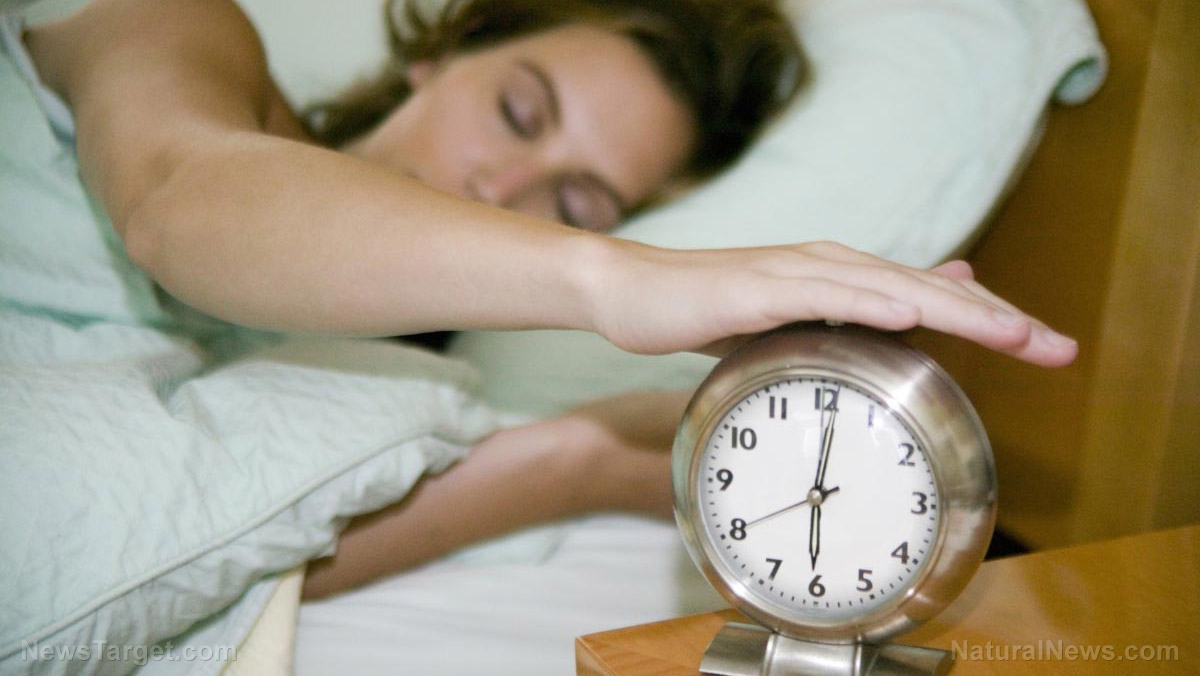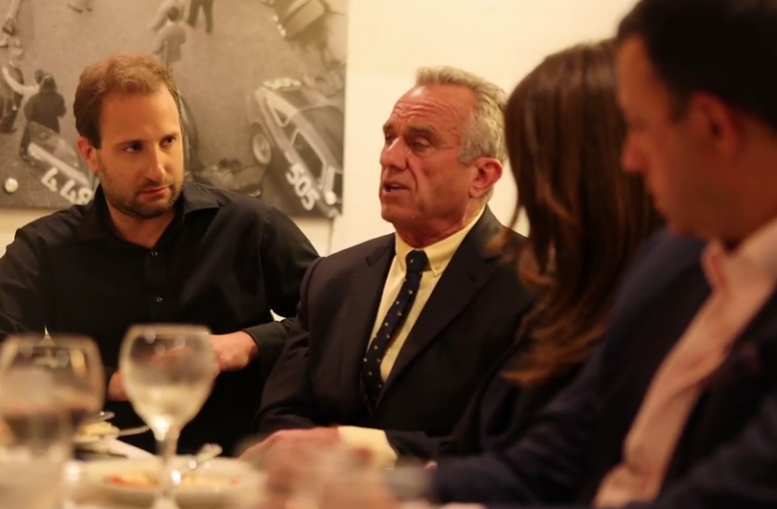The snooze button’s silent war on your health: How a few extra minutes steal your sharpness, sleep and even years of life
09/09/2025 / By Willow Tohi

- Snoozing fragments the final, restorative REM sleep cycle, replacing it with low-quality, light sleep and triggering “sleep inertia”—grogginess, fatigue and cognitive impairment.
- Repeated alarms spike stress hormones, increasing inflammation, weight gain and long-term risks like hypertension, heart disease and stroke—particularly in women.
- Over 50% of people worldwide snooze, with heavy users (20+ minutes daily) showing erratic sleep patterns; U.S., Sweden and Germany lead in snooze reliance.
- Artificial alarms disrupt natural sleep-wake cycles, worsening chronic health issues tied to inflammation—from diabetes to dementia—while Daylight Saving Time exacerbates cardiac risks.
- Experts recommend setting one alarm for the latest possible wake time, optimizing bedroom light exposure and addressing root causes of poor sleep (diet, stress, screen time) to avoid long-term damage.
For nearly half of the world’s population, the morning begins not with sunlight or a stretch, but with a violent negotiation: the shrill blare of an alarm, a groggy swipe at the snooze button and a desperate bid for “just five more minutes.” Yet new research reveals this seemingly harmless habit is far from benign. A global study published in Scientific Reports found that 56% of sleep sessions end with a snooze alarm, with heavy users losing up to 20 minutes daily to fragmented, low-quality sleep—robbing them of the most restorative phase of the night: REM.
The consequences extend beyond morning grogginess. Registered nurse Jordan Bruss, in a viral TikTok warning, explained that each snooze triggers a cortisol spike, the body’s stress hormone, which “traumatizes” the system by activating the fight-or-flight response repeatedly. “You’re starting your day by putting your body under stress,” Bruss said. Over time, this cycle is linked to weight gain, hypertension and even a 79% higher risk of heart disease in poor sleepers—findings echoed by a 2013 study on sleep’s role in gene expression and inflammation.
REM sleep under siege
The crux of the problem lies in sleep architecture. REM (rapid eye movement) sleep, which dominates the final hours before waking, is critical for memory consolidation, emotional regulation and brain detoxification. When an alarm interrupts this phase, the brain is thrust into sleep inertia—a state of impaired cognition that can last hours. “The snooze alarm disrupts some of the most important stages of sleep,” said Dr. Rebecca Robbins, lead author of the Mass General Brigham study. “Any sleep you get after hitting snooze is just light, fragmented sleep. You’re not getting back into REM.”
This disruption is particularly damaging for night owls forced into early schedules. Dr. Neal Walia, a UCLA sleep specialist, notes that college students waking at 8 a.m. for class—when their circadian rhythm craves 10 a.m.—often rely on snoozing to transition from slow-wave sleep (the deepest, most groggy phase) to lighter stages. While this may feel like a hack, Walia warns: “We don’t yet know the long-term effects of repeatedly truncating sleep cycles like this.”
The data is clear on short-term effects, though:
- Cognitive decline: Poor REM sleep is linked to dementia risk and impaired learning.
- Metabolic chaos: Cortisol spikes increase insulin resistance, promoting fat storage (especially visceral fat) and cravings for high-calorie foods.
- Cardiac time bombs: A 2014 study found women sleeping ?5 hours nightly had 8x the stroke risk; another linked poor sleep to a 23% higher chance of coronary artery disease.
A global epidemic: Who’s hitting snooze—and who’s resisting
The study’s global dataset (21,000+ users across 50 countries) revealed stark cultural differences:
- Top snoozers: Sweden (highest usage), followed by the U.S. and Germany, where 45% of participants snoozed on >80% of mornings.
- Least reliant: Japan and Australia, where cultural norms may prioritize consistent sleep schedules.
- Gender gap: Women snoozed slightly more than men, possibly due to higher rates of insomnia and sleep disruption from hormonal fluctuations.
Workweek patterns also emerged: Wednesday was peak snooze day, while weekends saw minimal use—suggesting social jetlag (the mismatch between biological and social clocks) drives dependence. “People are chronically sleep-deprived during the week,” Robbins said. “They’re using snooze as a band-aid for poor sleep hygiene.”
The cortisol-weight-inflammation triangle: How snoozing makes you sick
The domino effect of snooze-induced cortisol surges is well-documented:
- Cortisol ? Insulin ? Fat Storage: Elevated cortisol increases blood sugar, triggering insulin release—the body’s fat-storage signal. “Excess cortisol makes you gain and hang onto weight,” Bruss warned.
- Inflammation overdrive: Chronic stress hormones elevate CRP, TNF-alpha and interleukins, markers linked to heart attacks, strokes and autoimmune diseases.
- Immune sabotage: A 2016 American Society for Nutrition review found poor sleep weakens immune defense, increasing susceptibility to infections and chronic illness.
The irony? Short sleepers (<5 hours) snoozed less—likely because they had to wake up for work, leaving no time for negotiation. Meanwhile, heavy snoozers had the most erratic schedules, suggesting a vicious cycle: poor sleep ? snooze reliance ? worse sleep.
How to break the snooze cycle (without feeling like a zombie)
Experts agree: The goal isn’t to wake up earlier—it’s to sleep smarter. Here’s how:
- Set one alarm—for the latest possible time. “Calculate your absolute latest wake-up time and commit to it,” Robbins said. “No snooze buffer.”
- Harness natural light. Leave curtains slightly open to cue melatonin suppression at dawn, aligning with your circadian rhythm.
- Address root causes:
- Diet: Avoid processed foods, caffeine (half-life: 24+ hours!) and high-sugar meals that disrupt sleep.
- Stress: Cortisol-lowering practices like meditation, magnesium and adaptogens (ashwagandha, rhodiola) can improve sleep quality.
- Tech: Blue light from screens suppresses melatonin; aim for a 1-hour pre-bed digital detox.
- Prioritize consistency. Going to bed/waking at the same time daily—even on weekends—reduces social jetlag.
- Ditch daylight saving time. Studies show the spring time change spikes heart attacks by 70% in men. “It’s an outdated practice that harms health,” Robbins said.
Why sleep is the ultimate act of rebellion
In a world where artificial light, 24/7 work culture and digital addiction have severed our connection to natural rhythms, reclaiming sleep is radical. The snooze button symbolizes our collective exhaustion—a desperate grasp for rest in a system that glorifies burnout. Yet the science is unequivocal: Sacrificing sleep sabotages every pillar of health.
As Dr. Walia put it: “We’ve normalized being tired. But grogginess isn’t inevitable—it’s a sign your body isn’t getting what it needs.” The solution isn’t more alarms; it’s respecting the biology we’ve spent millennia evolving. Our ancestors slept with the sun. Modern life demands we relearn that wisdom—or pay the price in fatigue, disease and stolen years.
The sunrise solution
The next time your hand hovers over the snooze button, consider this: Those “extra” minutes aren’t rest—they’re a robbery. Of your sharpness, your metabolism, your heart. The real hack? Design a life where you don’t need an alarm at all. Until then, set one. Wake up. And step into the day—without the sabotage.
Sources for this article include:
Submit a correction >>
Tagged Under:
brain function, brain health, fight obesity, Glitch, heart health, mind body science, natural cures, remedies, sleep hygience, snoozing, tech addiction
This article may contain statements that reflect the opinion of the author





















